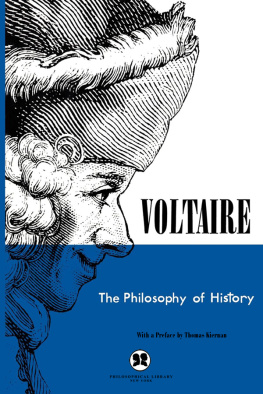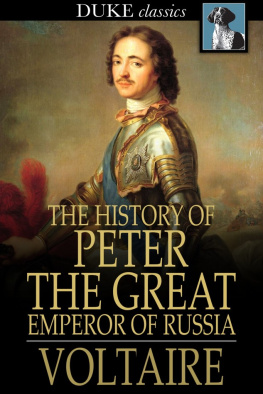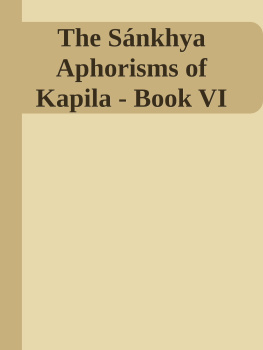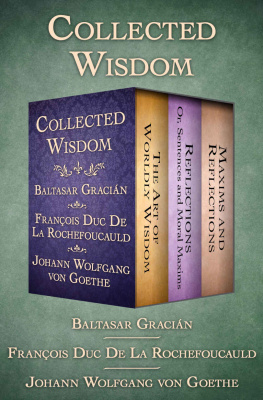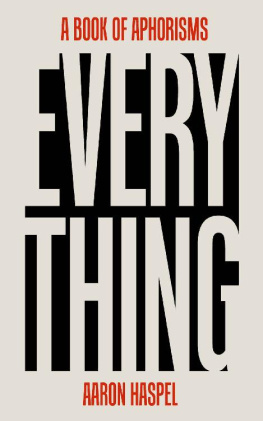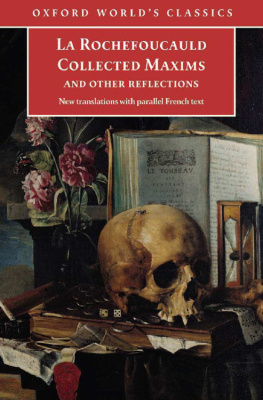Tancock Leonard - Maxims
Here you can read online Tancock Leonard - Maxims full text of the book (entire story) in english for free. Download pdf and epub, get meaning, cover and reviews about this ebook. City: London;New York, year: 1959, publisher: Penguin Books Ltd, genre: Science. Description of the work, (preface) as well as reviews are available. Best literature library LitArk.com created for fans of good reading and offers a wide selection of genres:
Romance novel
Science fiction
Adventure
Detective
Science
History
Home and family
Prose
Art
Politics
Computer
Non-fiction
Religion
Business
Children
Humor
Choose a favorite category and find really read worthwhile books. Enjoy immersion in the world of imagination, feel the emotions of the characters or learn something new for yourself, make an fascinating discovery.

- Book:Maxims
- Author:
- Publisher:Penguin Books Ltd
- Genre:
- Year:1959
- City:London;New York
- Rating:3 / 5
- Favourites:Add to favourites
- Your mark:
- 60
- 1
- 2
- 3
- 4
- 5
Maxims: summary, description and annotation
We offer to read an annotation, description, summary or preface (depends on what the author of the book "Maxims" wrote himself). If you haven't found the necessary information about the book — write in the comments, we will try to find it.
Maxims — read online for free the complete book (whole text) full work
Below is the text of the book, divided by pages. System saving the place of the last page read, allows you to conveniently read the book "Maxims" online for free, without having to search again every time where you left off. Put a bookmark, and you can go to the page where you finished reading at any time.
Font size:
Interval:
Bookmark:

MAXIMS
FRANOIS, DUC DE LA ROCHEFOUCAULD, was born in 1613. In his early years he was active in the intrigues against Richelieu and later in the Fronde, but he was severely wounded in the fighting in Paris in 1652 and his political career ended in discomfiture. Thereafter he lived quietly in a small, highly intellectual society which included Mme de Sabl, Mme de Svign and particularly Mme de La Fayette, to whom in his later years he was united in devoted friendship. His Mmoires Were first published in 1662 in an unauthorized and uncorrected form the authentic version appeared only in recent times. The first Paris edition of the Rflexions ou sentences et maximes morales, generally known as the Maximes, appeared in 1665; modifications and additions were made in later editions. His Rflexions diverses did not appear until long after La Rochefoucaulds death in 1680.
La Rochefoucaulds bitter and pessimistic philosophy had a wide influence in France: the Jansenists approved it as a confirmation of their doctrine of the vileness of fallen man; Voltaires Candide and the writings of Chamfort derive in part from it; Vauvenargues displays the inevitable reaction against it. Voltaire wrote that La Rochefoucauld contributed greatly to forming the taste of the nation; il accoutuma penser et renfermer ses penses dans un tour vif, prcis et dlicat.
LEONARD TANCOCK spent most of his life in or near London, apart from a year as a student in Paris, most of the Second World War in Wales and three periods in American universities as visiting professor. Until his death in 1986, he was a Fellow of University College, London, and was formerly Reader in French at the University. He prepared his first Penguin Classic in 1949 and, from that time, was extremely interested in the problems of translation, about which he wrote, lectured and gave broadcasts. His numerous translations for the Penguin Classics include Zolas Germinal, Thrse Raquin, The Dbcle, LAssommoir and La Bte Humaine; Diderots The Nun, Rameaus Nephew and DAlemberts Dream; Maupassants Pierre and Jean; Marivauxs Up from the Country; Constants Adolphe; La Rochefoucaulds Maxims; Voltaires Letters on England; Prvosts Manon Lescaut; and Madame de Svigns Selected Letters.
L A R O C H E F O U C A U L D
TRANSLATED
WITH AN INTRODUCTION BY
Leonard Tancock
PENGUIN BOOKS
PENGUIN BOOKS
Published by the Penguin Group
Penguin Books Ltd, 80 Strand, London WC2R 0RL, England
Penguin Putnam Inc., 375 Hudson Street, New York, New York 10014, USA
Penguin Books Australia Ltd, 250 Camberwell Road, Camberwell, Victoria 3124, Australia
Penguin Books Canada Ltd, 10 Alcorn Avenue, Toronto, Ontario, Canada M4V 3B2
Penguin Books India (P) Ltd, 11 Community Centre, Panchsheel Park, New Delhi 110 017, India
Penguin Books (NZ) Ltd, Cnr Rosedale and Airborne Roads, Albany, Auckland, New Zealand
Penguin Books (South Africa) (Pty) Ltd, 24 Sturdee Avenue, Rosebank 2196, South Africa
Penguin Books Ltd, Registered Offices: 80 Strand, London WC2R 0RL, England
www.penguin.com
This translation first published 1959
Copyright Leonard Tancock, 1959
All rights reserved
Except in the United States of America, this book is sold subject
to the condition that it shall not, by way of trade or otherwise, be lent,
re-sold, hired out, or otherwise circulated without the publishers
prior consent in any form of binding or cover other than that in
which it is published and without a similar condition including this
condition being imposed on the subsequent purchaser
EISBN: 9780141908144
IN his Age of Louis XIV Voltaire describes the Maxims of La Rochefoucauld as one of the works which contributed the most towards forming the taste of the French nation and giving it a feeling for aptness and precision. This little book of reflections about human nature, perhaps the most penetrating and disconcerting ever written, appeared in its original form, only about half the length of the text given here, in 1665, in the middle of the wonderful decade which saw the flowering of the genius of Molire, Racine, La Fontaine, Boileau, Bossuet, and a galaxy of masterpieces by artists in other forms, painting, sculpture, architecture, the age that is made alive for us by the incomparable letters of Mme de Svign, one of La Rochefoucaulds closest friends. Not that the Maxims were the product of a new, youthful movement in literature, for at that time the author was in his fifties, and prematurely aged by ill-health at that. They are, rather, the fruit of half a lifetime of activity and observation of others, recollected in the enforced tranquillity of middle-aged invalidism and generalized and condensed so as to be universally applicable.
Franois, duc de La Rochefoucauld, was born in Paris on the 15 September 1613, the eldest child of the first duke, before whom the family title for many generations had been that of Comte. His academic education was perfunctory, the usual training given to the heir of a great noble house who was destined for a military career until the moment of accession to the title, and to be married with all possible speed with a view to ensuring the succession. The Prince de Marcillac (courtesy title of the heir to the La Rochefoucauld dukedom) was married before he was fifteen to the even younger Andre de Vivonne, a wealthy heiress who in the fullness of time bore him eight children, to whom her husband occasionally referred in letters in conventionally affectionate terms, but who seems to have played no significant part in his life. She died in about 1670.
After a baptism of fire in a military campaign in Italy the young Marcillac embarked upon the treacherous waters of court life in the thirties of the seventeenth century, and at once the curiously contradictory elements in his character began to complicate his career. One side of him was shy, contemplative, reflective, and therefore somewhat awkward and constitutionally incapable of swift decisions and ruthless action. But his self-interest, ambition, and love of intrigue drew him into all sorts of schemings usually doomed to failure because he also had strong emotional, chivalrous, and self-sacrificing urges which led him to identify himself for purely sentimental reasons with persons or groups who seemed to him unfortunate or in some way victims, and to set himself against others in influential positions whom a less quixotic and more diplomatic courtier would never have antagonized. In a word he was destined to romantic self-dedication followed by bitter disillusion.
Such was to be the pattern of the first forty years of his life. The court of Louis XIII was a hotbed of intrigue, with a weak, aloof king, the arrogant, all-powerful Richelieu, and the meddlesome queen, Anne of Austria, hated by the cardinal and disliked and avoided by her husband. Marcillac of course devoted himself to the unpopular queen, though he was to admit much later, in his Memoirs, that affection for her maid of honour, Mlle de Hautefort, had something to do with it. But it is true that the queen was humiliated and insulted in all sorts of ways by the cardinal and the king, and the romantic young Marcillac saw himself as a knight-errant sent to help a lady in distress. He even suggests in his Memoirs, though the story is not corroborated anywhere else, that at one moment in 1637 the queens position became so intolerable that she begged him to escort her, accompanied of course by Mlle de Hautefort, to safety in Brussels. For his complicity in plots of this kind Marcillac was lucky enough to escape with only a week or two in the Bastille, followed by banishment to Verteuil, one of the family castles. After two years, however, he returned and resumed his army career.
Next pageFont size:
Interval:
Bookmark:
Similar books «Maxims»
Look at similar books to Maxims. We have selected literature similar in name and meaning in the hope of providing readers with more options to find new, interesting, not yet read works.
Discussion, reviews of the book Maxims and just readers' own opinions. Leave your comments, write what you think about the work, its meaning or the main characters. Specify what exactly you liked and what you didn't like, and why you think so.

